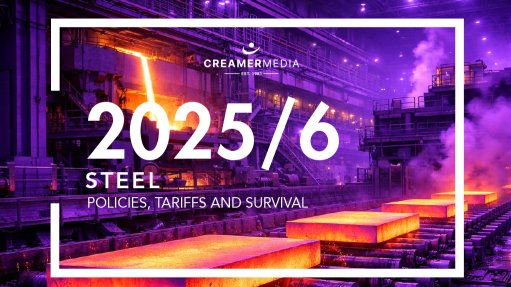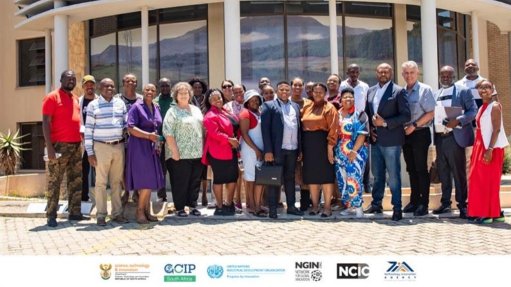Panel stresses importance of diversified supply chains
This is a pivotal moment in Africa’s journey, with the continent brimming with opportunity but also challenges.
“By 2050, the African population will reach 2.6-billion, so how can we ensure that there will be jobs and accelerated industrialisation?,” Critical Minerals Africa Group CEO Veronica Bolton-Smith questioned.
During a panel discussion she facilitated at the 2025 London Indaba, she listed some of the most pertinent current challenges as being price volatility, stockpiling and protectionist measures, which are key considerations for Africa to position itself as a global supplier of critical minerals.
Commenting on strategies that African countries could adopt to mitigate some of these challenges, independent think tank Centre for Strategic and International Studies critical minerals security director Dr Gracelin Baskaran said determining what a “critical mineral” is has been a difficult task globally, with the US alone, for example, having three different lists of critical minerals for different sectors such as energy, defence and digital technology.
Another determining factor of criticality is how vulnerable a supply chain is to disruption, including owing to foreign adversaries and concentrated markets, as well as geopolitical uncertainty and export restrictions.
“Critical minerals vary across every country, depending on their needs and development imperatives. However, the mutual fact is that every country needs diversified supply chains,” Baskaran stated, adding her conviction that no one country should have 100% control over any supply chain.
She said more African countries are realising that having one source of investment can be dangerous to their economies.
Critical minerals investor TechMet CEO and chairperson Brian Menell said TechMet was focused on building secure, well-governed and competitively priced supply chains, especially since, for example, China processes the vast majority of rare earths across the world.
The firm typically seeks projects and assets that are able to compete with China, which is difficult given that country’s dominant position in respect of economies of scale built up over the last two decades.
“This requires innovation and doing things differently to compete, including leveraging cheap government funding, ensuring low carbon footprints and building responsible supply chains – which are becoming more important for many customers of critical minerals,” Menell said.
TechMet invests in low- to medium-risk countries where it has a personal history of involvement and relationships. “What drives us to alternative jurisdictions are governments recognising the 20-year supply and demand dislocation of critical minerals as an opportunity that can be earned by incentivising investment.”
Consultancy McKinsey & Company associate partner Michel Foucart remarked that it was no secret that supply of many of the critical minerals was very concentrated, both on the mining and refining side.
“That concentration makes supply chains in and of itself very vulnerable to disruptions. In a best-case scenario, the disruptions weigh on short-term profitability for a company, but in a worst-case scenario, it can lead to downward pressure on competitiveness.”
Foucart added that there was strategic opportunity in thinking how countries and companies could go about sourcing sustainable materials rather than just buying from the market.
Companies can do a few things to mitigate supply chain risks in this regard, including diversified supply chains and checking where suppliers are buying from, mapping out exposure along the value chain, helping other companies to bring new supply online and innovating to change input requirements.
Private sector advocacy group Minerals Council South Africa CEO Mzila Mthenjane pointed out that, from a South African perspective, the country’s mineral endowment was vast and it had a record of producing critical minerals already.
He added that South Africa had determined minerals as critical according to the role they can play in development.
“While mining plays an important role, South Africa also has an important role to get together with the rest of the continent to contribute towards world imperatives. Balancing the immediate needs for social impact and development with the future needs of availability of minerals is where we find ourselves, with legislation being pivotal toward that,” Mthenjane said.
Mining can enable infrastructure development, including for renewable energy, logistics and water.
Mthenjane highlighted that where mining companies were present, they often invested in the refurbishment and installation of new infrastructure. “That, certainly, advocates for a better mining environment that can be a catalyst for so much more development than merely building mines.”
Article Enquiry
Email Article
Save Article
Feedback
To advertise email advertising@creamermedia.co.za or click here
Press Office
Announcements
What's On
Subscribe to improve your user experience...
Option 1 (equivalent of R125 a month):
Receive a weekly copy of Creamer Media's Engineering News & Mining Weekly magazine
(print copy for those in South Africa and e-magazine for those outside of South Africa)
Receive daily email newsletters
Access to full search results
Access archive of magazine back copies
Access to Projects in Progress
Access to ONE Research Report of your choice in PDF format
Option 2 (equivalent of R375 a month):
All benefits from Option 1
PLUS
Access to Creamer Media's Research Channel Africa for ALL Research Reports, in PDF format, on various industrial and mining sectors
including Electricity; Water; Energy Transition; Hydrogen; Roads, Rail and Ports; Coal; Gold; Platinum; Battery Metals; etc.
Already a subscriber?
Forgotten your password?
Receive weekly copy of Creamer Media's Engineering News & Mining Weekly magazine (print copy for those in South Africa and e-magazine for those outside of South Africa)
➕
Recieve daily email newsletters
➕
Access to full search results
➕
Access archive of magazine back copies
➕
Access to Projects in Progress
➕
Access to ONE Research Report of your choice in PDF format
RESEARCH CHANNEL AFRICA
R4500 (equivalent of R375 a month)
SUBSCRIBEAll benefits from Option 1
➕
Access to Creamer Media's Research Channel Africa for ALL Research Reports on various industrial and mining sectors, in PDF format, including on:
Electricity
➕
Water
➕
Energy Transition
➕
Hydrogen
➕
Roads, Rail and Ports
➕
Coal
➕
Gold
➕
Platinum
➕
Battery Metals
➕
etc.
Receive all benefits from Option 1 or Option 2 delivered to numerous people at your company
➕
Multiple User names and Passwords for simultaneous log-ins
➕
Intranet integration access to all in your organisation


















